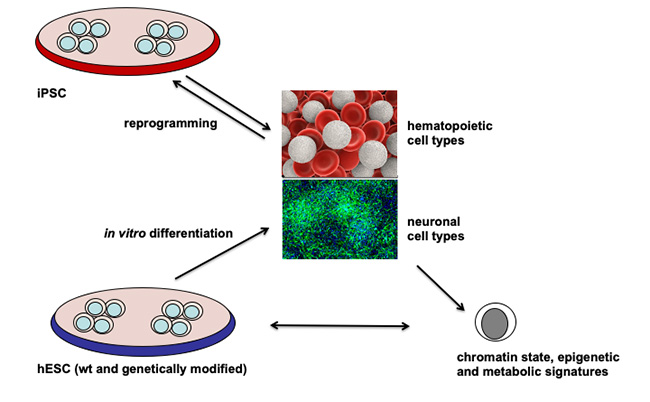What is your field of research and what are the main aims of your lab?
My focus is on developmental and stem cell biology. My group’s research interests
revolve around deciphering the molecular processes that govern human pluripotent stem cell renewal, as well as early human hematopoietic and neural development.

What project(s) are you working on at the moment, and what do you hope to discover?

Our projects focus on the interplay of mitochondrial biogenesis and epigenetics, and how the dysregulation of mitochondrial function impacts on cell fate decisions. In addition, we are studying the IFN-independent functions of the transcriptional activator STAT2 (Signal Transducer And Activator of Transcription 2).
What is the potential translational impact of your research? Could certain diseases be more effectively treated through a more comprehensive understanding of stem cell renewal and differentiation?
Embryonic stem cells (ESC) are the starting point for the development of the human organism, representing the precursor of all cell types we can find in the human body. ESC hold tremendous potential for regenerative medicine, however, their use is often limited by the lack of efficient or functional differentiation protocols. As an example, there is a particular interest in generating long-term repopulating hematopoietic stem cells (HSC) in the dish. HSCs could be used for bone marrow transplantations, where the need far outweighs available donor material. One limitation is that we do not fully understand which transcriptional networks are needed to define a long-term hematopoietic stem cell, and to date, the cells we can derive in the dish lose their repopulation capacity within several weeks. Better understanding of stem cell biology is required to one day overcome these limitations.
What motivates you about working in research?
I am mainly driven by curiosity, and coming up with creative ideas to improve something. I also like the challenge of solving unsolved problems.
What have been the biggest breakthroughs in your field of research in the past 10 years, in your opinion?
I think the discovery of inducing pluripotency in somatic cells by expressing the
transcription factors Oct4, Klf4, Sox2 and c-Myc is possibly the most important breakthrough. These so-called ‘induced pluripotent stem cells’ (iPSC) have the capacity to differentiate into every cell type found in the adult body, and provide an ideal source for disease modeling, drug discovery, and regenerative medicine.
Where do you think your field of research will be in ten years?
One focus currently is the generation of somatic cell types from stem cells that could be used for regenerative medicine and transplantation medicine. Hopefully the field will manage to generate long-term repopulating HSCs or find effective ways to treat disorders where we currently have limited treatment options, such as neural degenerative diseases or muscle dystrophies.
Tell us a little bit about what you were doing before you joined NCMM
I did my PhD in Belgium in the lab of Stefan Constantinescu working on hematopoiesis and cytokine receptor signaling. After this I became a postdoctoral fellow at the Whitehead Institute, MIT, Cambridge US, in the lab of Dr. Rudolf Jaenisch where I worked on somatic cell reprogramming.
What has been the greatest moment in your career so far?
The opportunity to start my own lab at NCMM. Developing and running my own research projects is a great opportunity.
What would you be doing if you weren’t working in research?
This is difficult to answer. I would most probably still work in the natural sciences or a related field. I did consider studying veterinary medicine after high school, and another field I find very interesting is psychology.
